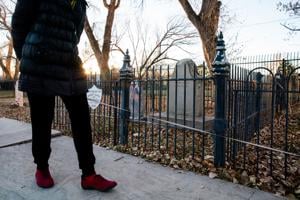Lifestyle
Taos Pueblo Proposes Renaming Kit Carson Park to Red Willow Park

TAOS — The leadership of Taos Pueblo has proposed renaming Kit Carson Park to “Red Willow Park.” The town’s Kit Carson Renaming Committee announced that it will present this recommendation to the town council during a special meeting on November 17, 2023. This initiative follows ongoing discussions about renaming the park, which honors the legacy of famed frontiersman and soldier, Kit Carson, and has been a point of contention since 2011.
Carson, who lived in Taos for 25 years, has a house and grave that attract both tourists and vandals. The Taos Pueblo, known as the Red Willow people, previously rejected the name “Red Willow Park” due to a lack of involvement in the decision-making process. However, at a meeting on October 23, 2023, the committee received a letter from the Taos Pueblo Tribal Council detailing six conditions for accepting the new name. According to Committee Chair and town Councilor Genevieve Oswald, “All six of those points can be met. This was just the door opening.”
During the committee meeting, Jeremy Lujan, the Tribal Secretary, joined Jesse Winters, the Second Tribal Sheriff and a member of the renaming committee, to read the letter from the council. “We are the Tiwa people of Taos Pueblo. This valley is not a place we occupy — it is who we are,” Lujan stated. He emphasized the long history of the Tiwa people in the region, stating, “When we say this land is unceded Tiwa land, we mean what words cannot fully capture: We did not lawfully transfer our homeland to another nation.”
Conditions for Name Change Highlight Indigenous Concerns
The Tribal Council’s letter outlined concerns regarding the renaming process, criticizing modern frameworks that appear inclusive but often neglect the voices of Indigenous communities. “The current renaming process has revealed the modern version of a familiar pattern: committees, panels, and campaigns that appear inclusive but fail to center the living sovereign people of the place they aim to change,” the letter stated. It called for a reevaluation of how decisions about place names and public memory are made, asserting, “This procedural erasure looks different than conquest by force but produces the same result: decisions made about us without us.”
Carson’s legacy is complex. While his name is prominent throughout the West, particularly in Northern New Mexico as the namesake of Carson National Forest, his reputation is marred by his involvement in violent campaigns against Native American groups, including the Navajo and Mescalero Apache. In 2023, an obelisk in Santa Fe honoring Carson was toppled, reflecting growing discontent with his legacy.
Oswald expressed hope that the committee’s efforts could lead to meaningful change. “Changing the name does nothing to change the relationship,” she remarked. “If we really want this to be good work, it has to go deeper and enable deeper, longer, social-relational change.”
Members of Taos Pueblo, including Dr. Christina M. Castro and Turquoise Chenoa Velarde, echoed these sentiments. Castro suggested that simply changing the name might be performative unless accompanied by broader efforts to address the historical context. “It’s time to stop valorizing these eras that are so harmful to our people,” she said, advocating for a more comprehensive approach to healing and repair between communities.
Velarde, a descendant of individuals affected by the Long Walk — the forced relocation of the Navajo — emphasized the need for action beyond symbolic gestures. “We need people who are ready to do more than clap for justice,” she stated. “We need people willing to fight for it. It goes beyond this. It should not stay performative.”
Broader Implications of the Name Change
The committee also discussed concerns about the argument that removing names like Carson’s could limit discussions about their historical impacts. Velarde countered that there are ways to educate the public on these matters through context, educational curricula, and tourism materials while still changing the name. She pointed out that retaining Carson’s name signals the town’s priorities and can marginalize Indigenous narratives: “For it to stand as a priority means that we are not the priority, and then our story isn’t and our history isn’t.”
The Tribal Council’s letter poignantly addressed the significance of names in public spaces: “When a name is given to a place in the public sphere, it frames what people remember, who is visible, and whose authority is assumed.” This perspective highlights the long-standing impact of colonial narratives and their role in obscuring Indigenous histories and experiences.
As the Taos community prepares for the upcoming council meeting, the discussions around the proposed renaming of Kit Carson Park reflect deeper questions of identity, history, and the ongoing struggle for recognition and respect among Indigenous peoples.
-

 Lifestyle3 months ago
Lifestyle3 months agoLibraries Challenge Rising E-Book Costs Amid Growing Demand
-

 Sports3 months ago
Sports3 months agoTyreek Hill Responds to Tua Tagovailoa’s Comments on Team Dynamics
-

 Sports3 months ago
Sports3 months agoLiverpool Secures Agreement to Sign Young Striker Will Wright
-

 Lifestyle3 months ago
Lifestyle3 months agoSave Your Split Tomatoes: Expert Tips for Gardeners
-

 Lifestyle3 months ago
Lifestyle3 months agoPrincess Beatrice’s Daughter Athena Joins Siblings at London Parade
-

 World3 months ago
World3 months agoWinter Storms Lash New South Wales with Snow, Flood Risks
-

 Science3 months ago
Science3 months agoTrump Administration Moves to Repeal Key Climate Regulation
-

 Business3 months ago
Business3 months agoSoFi Technologies Shares Slip 2% Following Insider Stock Sale
-

 Science2 months ago
Science2 months agoSan Francisco Hosts Unique Contest to Identify “Performative Males”
-

 Science3 months ago
Science3 months agoNew Tool Reveals Link Between Horse Coat Condition and Parasites
-

 Sports3 months ago
Sports3 months agoElon Musk Sculpture Travels From Utah to Yosemite National Park
-

 Science3 months ago
Science3 months agoNew Study Confirms Humans Transported Stonehenge Bluestones









